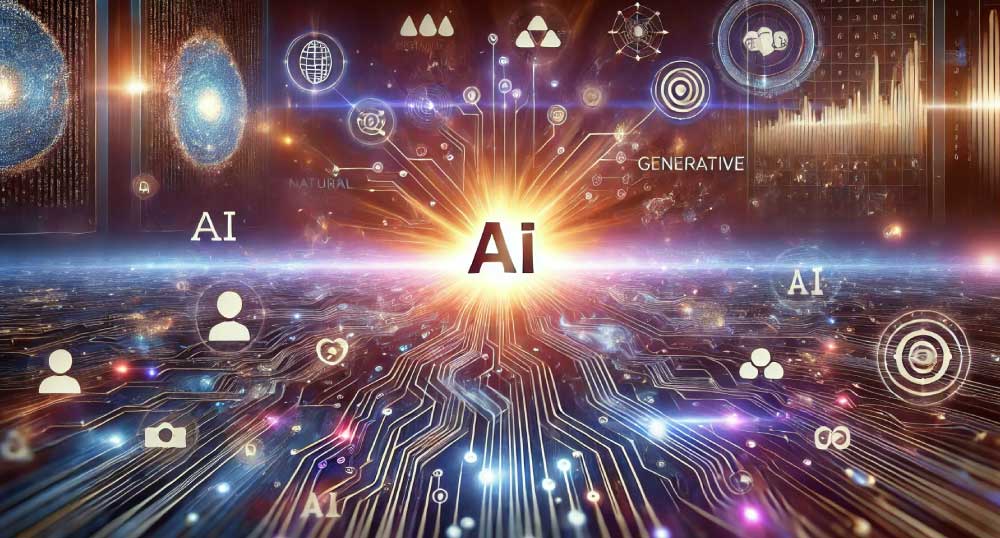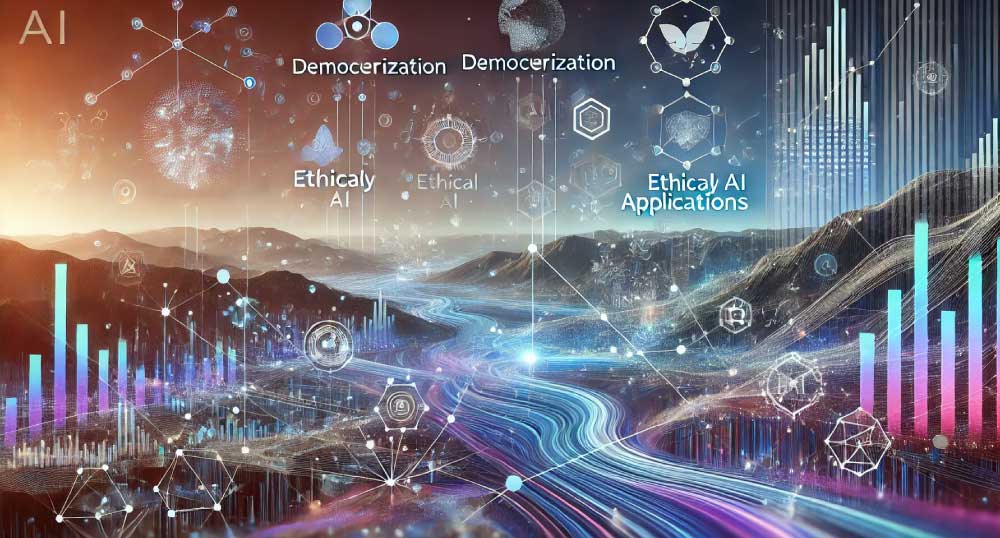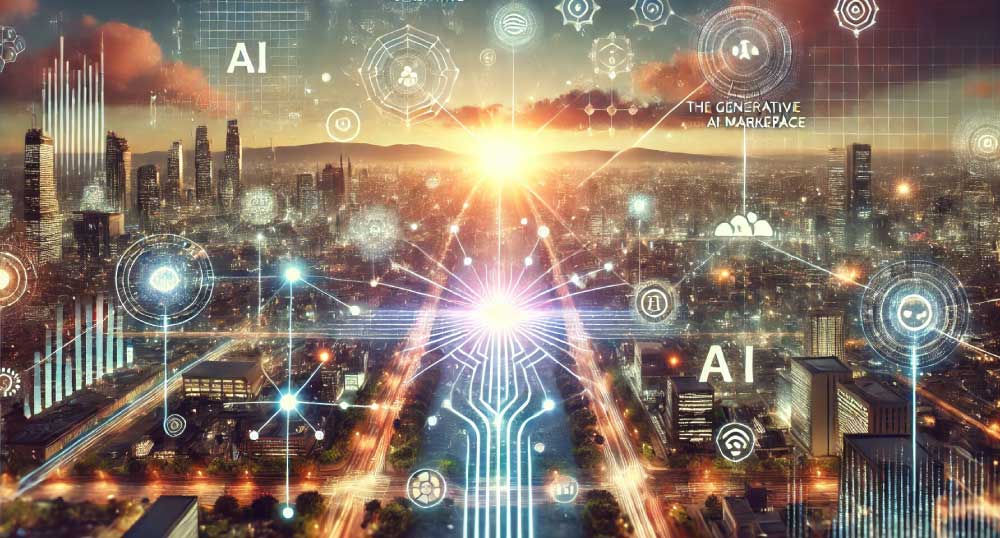
Generative AI, the cutting-edge technology behind remarkable innovations like ChatGPT and DALL-E, is rapidly transforming industries at an unprecedented pace. Its ability to generate human-quality text, images, music, and even code is revolutionising how we work, create, and consume information. But what does this explosive growth mean for the marketplace, and how can businesses and individuals position themselves to benefit from it? Let’s take a closer look.

The Rapid Growth of Generative AI
The generative AI market is expanding at an exponential rate, capturing the attention of tech giants and startups alike. This growth isn’t just a passing trend—it’s a fundamental shift in how businesses operate and innovate.
Tech Titans Leading the Charge
Companies like Google, Meta, Microsoft, and OpenAI are pouring billions into generative AI research and development. These industry leaders are driving innovation by developing advanced models that are being integrated into various sectors. For example, OpenAI’s ChatGPT, backed by Microsoft’s $10 billion investment, has revolutionized customer service and content creation, allowing businesses to automate and enhance operations without a corresponding increase in human resources. This is part of a broader trend where tech giants are pushing the boundaries of AI, setting the stage for even more significant advancements. You can read more about these investments and their impacts in this article by EY and this report by Mckinsey.
Startups and Niche Players
While major corporations dominate the spotlight, smaller companies are making significant strides by focusing on niche applications of generative AI. These agile startups are disrupting traditional industries, particularly in areas like AI-powered drug discovery. In healthcare, for example, startups are using AI to analyze vast datasets and identify potential new treatments, significantly reducing the time it takes to develop new drugs. Their ability to innovate quickly gives them an edge over larger competitors in specialized fields. For more on the role of startups in the generative AI ecosystem, check out this detailed overview.

Key Trends Shaping the Marketplace
Several trends are defining the generative AI marketplace, each contributing to its dynamic nature and potential for future growth.
Model Democratisation
Generative AI is no longer a tool reserved for tech behemoths. Cloud-based platforms and APIs are democratizing AI, making it accessible to developers and businesses of all sizes. For instance, small businesses are using cloud-based AI tools to generate marketing content and analyze customer data—tasks that were once possible only for large corporations with extensive resources. This democratization is driving innovation across industries, enabling a wider range of companies to harness the power of AI. You can dive deeper into the democratization of AI here.
Ethical Considerations
As generative AI continues to evolve, so too do the ethical challenges it presents. Issues like bias, misinformation, and copyright infringement are becoming more prominent as AI-generated content blurs the line between human and machine creation. These concerns highlight the importance of developing AI responsibly and deploying it in ways that build trust with users and stakeholders. The ethical implications of AI are not just theoretical; they are real and must be addressed to ensure the technology’s long-term success. Learn more about these ethical challenges in this UNESCO article.
Industry-Specific Applications
Generative AI is being adopted across various industries, each facing unique challenges and opportunities. In healthcare, AI is personalizing treatment plans; in finance, it’s enhancing fraud detection; and in marketing, it’s automating content creation and customer interactions. In the entertainment industry, for example, AI is being used to create original music and artwork, opening up new creative possibilities. These industry-specific applications are not only solving existing problems but also creating new business opportunities. For more insights into how AI is revolutionizing industries, check out this article here.
Monetization Challenges
Despite its potential, monetizing generative AI is a challenge for many companies. Finding sustainable business models is crucial for long-term success. AI-driven platforms are increasingly exploring subscription models for accessing premium AI-generated content, such as personalized newsletters and automated video production. However, these approaches must balance profitability with the need to maintain user trust and data security. Discover more about the strategies companies are using to monetize generative AI in this resource here.

Challenges and Opportunities
The generative AI marketplace is a hotbed of both challenges and opportunities. Understanding these dynamics is essential for anyone looking to thrive in this space.
Talent Scarcity
The demand for skilled AI professionals is far outstripping supply, creating a talent gap that hinders development and innovation. Companies are responding by investing heavily in training programs and forming partnerships with academic institutions to cultivate the next generation of AI talent. For instance, tech firms are working with universities to develop AI-specific curricula, ensuring a steady pipeline of skilled professionals. For more on the AI talent shortage, see this article.
Data Privacy and Security
Generative AI models require vast amounts of data, raising significant concerns about privacy and security. Companies must implement robust data protection measures not only to comply with legal obligations but also to maintain consumer trust. Encryption and anonymization techniques are increasingly being used to protect user data while still leveraging it for AI training. You can read more about these privacy issues here
Intellectual Property Rights
The ownership of AI-generated content is a complex legal issue with far-reaching implications. As generative AI continues to advance, the legal frameworks governing intellectual property will need to evolve as well. The ongoing debate over whether AI-generated artwork can be copyrighted underscores the significant implications for creators and businesses alike. To explore more on AI and intellectual property, visit this resource from WIPO.

Conclusion
The generative AI marketplace is evolving rapidly, offering immense potential for those who can navigate its challenges and capitalise on its opportunities. As the technology matures and becomes more accessible, we can expect even more groundbreaking applications and disruptive innovations. Staying informed about the latest trends and developments is not just beneficial—it’s essential for businesses and individuals looking to thrive in this new era. By embracing generative AI and its possibilities, we stand on the brink of a technological revolution that will reshape the future of work, creativity, and beyond.
